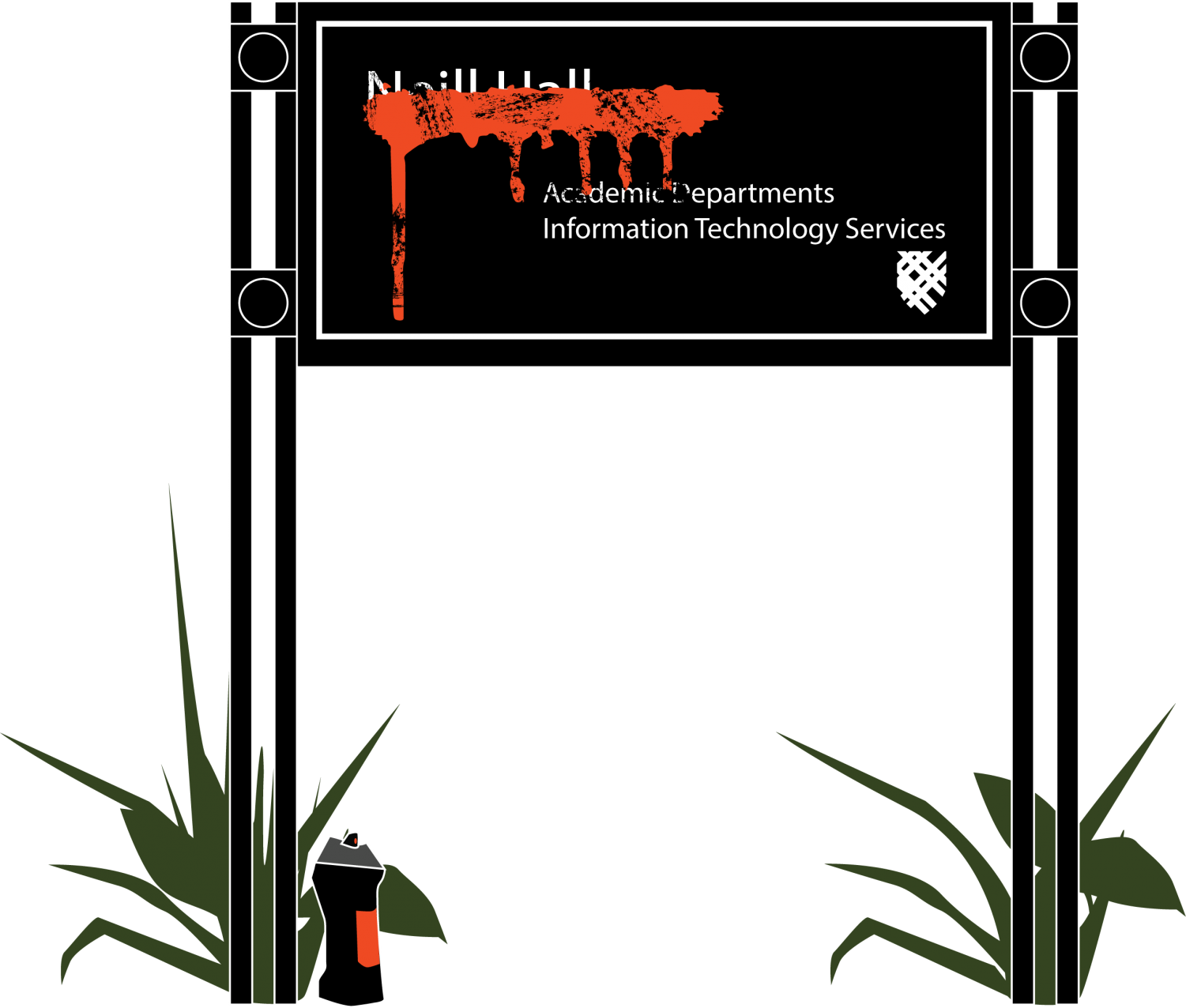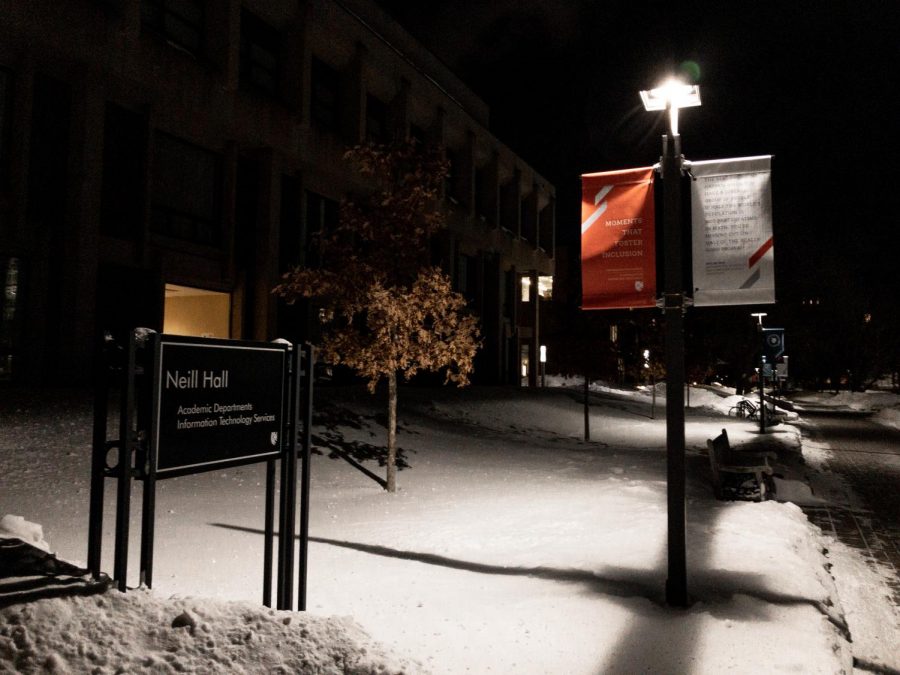Inside the 2013 renaming of Neill hall
October 31, 2019
Six years ago, in October 2013, Macalester’s Board of Trustees made a momentous decision: it voted to change the name of the college’s Humanities Building to Neill Hall.
That year, Macalester had contracted consultants to complete a campus wayfinding plan as part of a broad effort to make it easier for visitors to access the campus.
The consultants, noting that many of the college’s humanities departments were actually located in Old Main, reported that the name “Humanities Building” could be a source of confusion and recommended that Macalester consider naming the building for something or someone else.
College officials had someone in mind. Rev. Edward D. Neill, secretary to American presidents and founder of the college, did not have a building on campus named after him — just a meeting room on the second floor of Weyerhaeuser Hall.
“Changing the name to reduce the confusion,” Acting President Kathy Murray told The Mac Weekly at the time, “gave us a perfect opportunity to honor President Neill.”
Vice President of Administration and Finance David Wheaton described a similar process: the college’s senior staff recognized the potential confusion caused by the Humanities Building name and the relatively minor place Neill’s name had on campus.
“Those dots connected, and we came up with the idea,” Wheaton said.
Neither students nor faculty were formally consulted about the renaming. The resolution to change the name of the building to Neill Hall was officially brought forward to the board by Peter Fenn ’70 on behalf of Peter Ahn ’87, who was then chair of the advancement committee.
The resolution described Neill as a “pioneer, clergyman and educator,” detailed his government service and work in education and noted that his “rich legacy is still visible today” in the shape of Macalester and House of Hope Presbyterian Church.
Its final line resolved that the Humanities Building be renamed “in appreciation and recognition of Edward Duffield Neill’s visionary work that laid Macalester College’s foundation and shaped its distinctive mission.”
The resolution was undersigned by then-Chair of the Board of Trustees David Deno ’79 and President Brian Rosenberg, who was on sabbatical. It passed unanimously — and apparently, no one with access to the college’s chief decision-makers voiced any objection.
“There were very few questions and no concerns expressed about the name change,” then-Vice President for Student Affairs Laurie Hamre told The Mac Weekly at the time.
Following the board’s vote, the name change took immediate effect. The Macalester community was informed of the name change through a bulletin in the Daily Piper — now the Mac Daily — on Oct. 10 submitted by media relations manager Barbara K. Laskin.
For many on campus, the renaming was a non-event.
“Neill was, at the time, considered to be a pretty straightforward figure,” Wheaton said. “Original founder, in the college histories it identified him as a secretary to Abraham Lincoln, active here with respect to education.”
Faculty and students, two constituencies that in the past several years have raised objections to the commemoration of Neill, were largely quiet as well.
“It was just accepted,” anthropology professor Olga González said. “It seemed innocuous. Like, okay, another founder. Another building with another founder’s name. The problematic part is that we didn’t ask any questions. And in that way, we all play[ed] a complicit role.
“If Macalester is our home, and it is liberal-progressive, it is going to take care of all of us following these important values,” she continued. “So you just assume — and this teaches us that you never should assume.”
The administration assumed as well. Wheaton said that he did not recall “any sort of deep dive” into Neill’s history during the renaming process, even though all of Neill’s racist writings are available both publicly and in the college archive.
The fact that the college did not think to research Neill’s past, given his religious occupation and prominent presence in Minnesota during colonization, speaks volumes.
“I think it’s really striking that there wasn’t a deep dive into who he was,” history professor Katrina Phillips said. “Part of it goes to show… [that] indigenous history remains one of the most under-taught components in K-12, in higher ed, and so can we really be that surprised by it?”
However, even in 2013, Neill’s biography was not a mystery to everyone at the college.
That November, roughly a month after the name change was announced, the Facebook account Mac Confessions posted a submission which read, “Edward Neill robbed indigenous graves, engaged in the destruction of the Dakota people and culture as a missionary and settler and fought to prevent women from attending Macalester.
“This is who we decide to honor by naming a building after?”
In the coming years, thanks to the committed activism of indigenous students and others concerned with Neill’s history, a fuller picture of the man who founded Macalester has come to light.
“The decision on the naming of Neill Hall was made many years ago, and I do not remember many of the details,” Murray, who is now president of Whitman College in Walla Walla, Washington, wrote in an email to The Mac Weekly.

“The first decision was that Mac should have a better name for that building,” she continued. “I recall discussion that it seemed strange that the college did not have any buildings named for its founder.”
Murray declined to address whether she thinks that, given the history brought to light over the last several years, Neill’s name should remain on the building.
Similarly, Wheaton said that he was unsure if the college would have named the building after Neill had many of its leaders known then what they have since learned about him.
“Hard to know,” Wheaton said. “And I don’t want to sort of guess what all my colleagues would have picked up on or how the board [of trustees] would have responded. It just didn’t come across anybody’s radar at that point.”
Macalester does not have an official process by which buildings or other spaces on campus are named or renamed. While college buildings are sometimes named in conjunction with donations, the renaming of Neill Hall was not associated with a financial gift.
It was a decision that Macalester made completely of its own volition.
This article is part of the Mac Weekly’s special reporting project, Colonial Macalester. Read the entire issue here.













